Ziedleju Street 1, Marupe, Marupes Area, Latvia
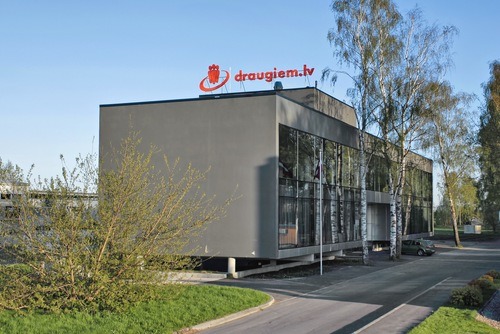
Alvis likes the huge mess covering his desk and the floor-to-ceiling window that allows him to ignore it. Artūrs likes the fact that everyone can see his screen and pop in with feedback before he’s done hours of unnecessary work. Gustavs likes knowing when dinner has arrived and when the toilets are free.
Gustavs Cirulis does not sit next to the bathroom, nor does he stand by Alvis’ big window watching for the takeout guy. Cirulis and Alvis Rozenbergs and Artūrs Vanags work at the Draugiem Group, parent company of Latvian social network Draugiem (“for friends”), more popular in Latvia than Facebook (!). Monitors show employees not only which toilets are available, but also who is at their desk, which conference rooms are open, and the temperature inside and out. At the front door, an iPad secretary greets visitors and summons the appropriate Draugiem staffer.
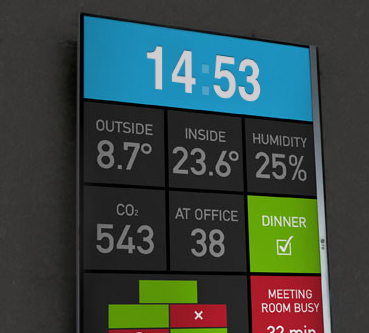
Draugiem’s office exemplifies what practical science can do for employee efficiency and comfort, and highlights co-founder Lauris Liberts' entrepreneurial obsession with all things tech. The bug bit Liberts in the late 1990s, when the young Latvian was busing tables in New York City and watching Internet bubbles swell and pop. Back home, he teamed up with tech-savvy Agris Tamanis, and the two started a localized social network in 2004. Today the € 15 million ($20 million US) company comprises not only the social network, but also 15 other ventures including Startup Vitamins, whose posters bear zingy motivational exhortations such such as “Move Fast and Break Things" and "Fuck Mediocrity.”
While the rigged office space certainly reflects the founders’ tech-affection and the company’s dedication to employee comfort and productivity, the building itself reflects recent Latvian economic history.
In 2007/2008, Latvia shuttled downward into a severe economic depression. Support for the arts stagnated. To “save” modern art, a family of artists built a massive gallery space on the outer, industrial edges of Riga. The city was born in the 12th century on the shores of the Baltic, and today is Latvia’s largest city and a cultural hotspot.
Taking cues from European minimalism, the artists aimed for an open, neutral space framed by glass and concrete and outfitted with fiber optics; a welcoming showplace for an array of cultural offerings. However, the family soon fell prey to the same economic struggles as the rest of the country and had to rent out the space.
After inviting in several potential tenants, the artists found their ideal in Draugiem. Where others queried about wallpaper and carpeting, Draugiem’s principals appreciated the building’s essence. Adding an orange mega-logo to the rooftop and greenery inside and out (including an interior living wall in a conference room called “Tropics”), Draugiem celebrated, rather than squashed, the open spirit of its new space.
"The interior is planned by our designers," Julia Gifford told Dribbble. Gifford serves as Draugiem’s content marketing director. “They have a knack and feel for the company’s identity.” Workspaces are open and communal. Eclectic, friendly, comfortable chairs ranging from beanbags to plastic geometrics fill the conference rooms. The kitchen holds long tables where employees enjoy family-style catered meals. “We don’t work close to any shops or restaurants, so it’s more convenient,” Gifford said. “It also means we don’t take as much time for lunch — eat, and come back to work. Also, it’s a hell of a team building experience. You’re breaking bread daily with each of your colleagues.”
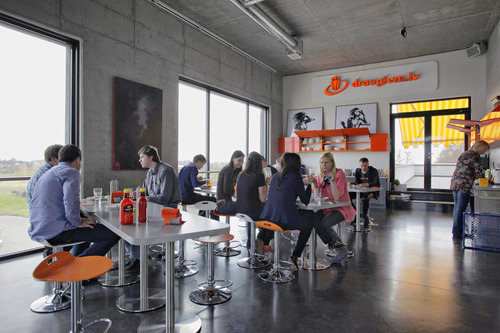
Up top? Draugiem’s crowning glory: a hangout complete with (fake) grass. Take it away, Julia:
"Our rooftop is a source of pride for us. One half is entirely green … with comfy seats to go out, work, have lunch, meetings or just hang out with coworkers and party together on Friday nights. … The other half used to be just black tarmac. But we built a sort of meeting room [the “Guest Room”] out of wood and glass. It would be our space to invite larger groups, since we often give group tours … and have inspiring people come and talk."
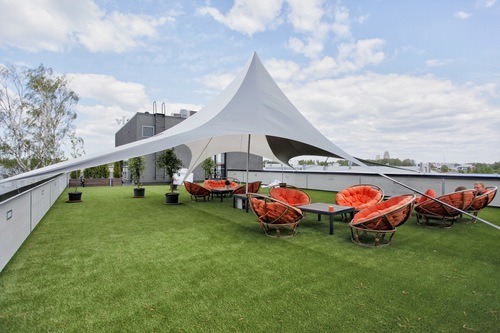
The rooftop also encourages building-to-building visual camaraderie. “There seems to be a rooftop culture in the neighborhood,” Gifford said. “From where I sit if I look in one direction, I see a rooftop terrace with a barbecue where the employees enjoy the occasional drink and kabob, the Latvian grilled meat of choice, and in the other direction I see a large blue swing on the roof of a tobacco company’s building.”
All Draugiem’s extras, from the faux-turf lounge to the toilet monitors, not only make the company an attractive place to work, but also arguably contribute to the bottom line via increased employee satisfaction and efficiency. Draugiem’s now attempting to figure out which internal tech elements would be most popular in other office environments. The results will be packaged and sold as 1work.
Products such as 1work have been born of a company need or process and generalized to appeal to a broad audience. Draugiem arrived at its marvelous office in reverse: Creatively retrofitting someone else’s architecture with elements that meet the company’s practical needs and express its designers’ visual sensibilities. The result: respectful transformation.
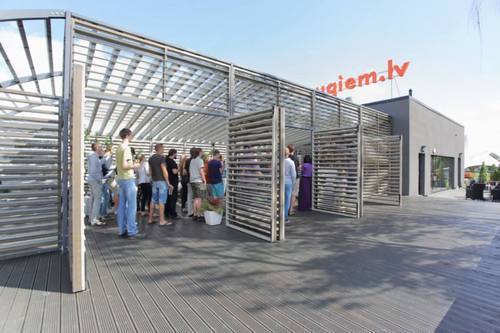
Go visit Draugiem’s Dribbblers: Gustavs Cirulis, Alvis Rozenbergs and Artūrs Vanags.
Thank you for your help: Julia Gifford, content marketing specialist, Draugiem Group. Draugiem also has an office in Burbank, California, USA.
Find more Spaced stories on our blog Courtside. Have a suggestion? Contact stories@dribbble.com.







